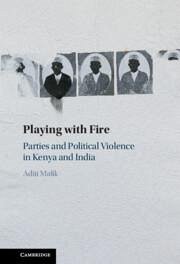
Playing with Fire
Versandkostenfrei!
Versandfertig in über 4 Wochen
95,99 €
inkl. MwSt.

PAYBACK Punkte
48 °P sammeln!
Drawing on a rare cross-regional comparison of Kenya and India, Playing with Fire develops a novel explanation about ethnic party violence. Combining rich historical, qualitative, and quantitative data, the book demonstrates how levels of party instability can crucially inform the decisions of political elites to organize or support violence. Centrally, it shows that settings marked by unstable parties are more vulnerable to experiencing recurring and major episodes of party violence than those populated by durable parties. This is because transient parties enable politicians to disregard vote...
Drawing on a rare cross-regional comparison of Kenya and India, Playing with Fire develops a novel explanation about ethnic party violence. Combining rich historical, qualitative, and quantitative data, the book demonstrates how levels of party instability can crucially inform the decisions of political elites to organize or support violence. Centrally, it shows that settings marked by unstable parties are more vulnerable to experiencing recurring and major episodes of party violence than those populated by durable parties. This is because transient parties enable politicians to disregard voters' future negative reactions to conflict. By contrast, stable party organizations compel politicians to take such costs into account, thereby dampening the potential for recurring and severe party violence. By centering political parties as key actors in the production of conflict, and bringing together evidence from both Africa and South Asia, Playing with Fire contributes new insights to the study of political violence.




